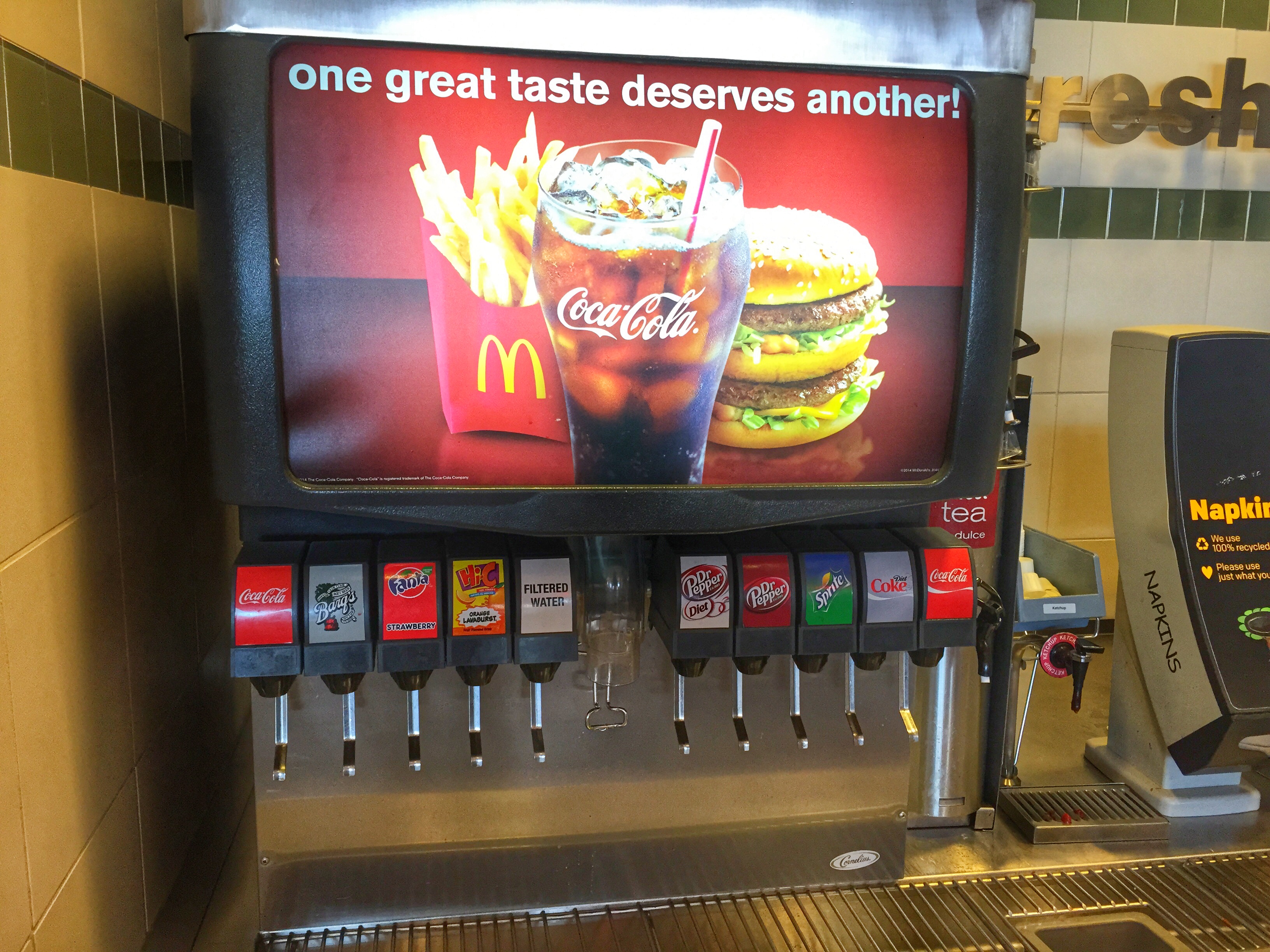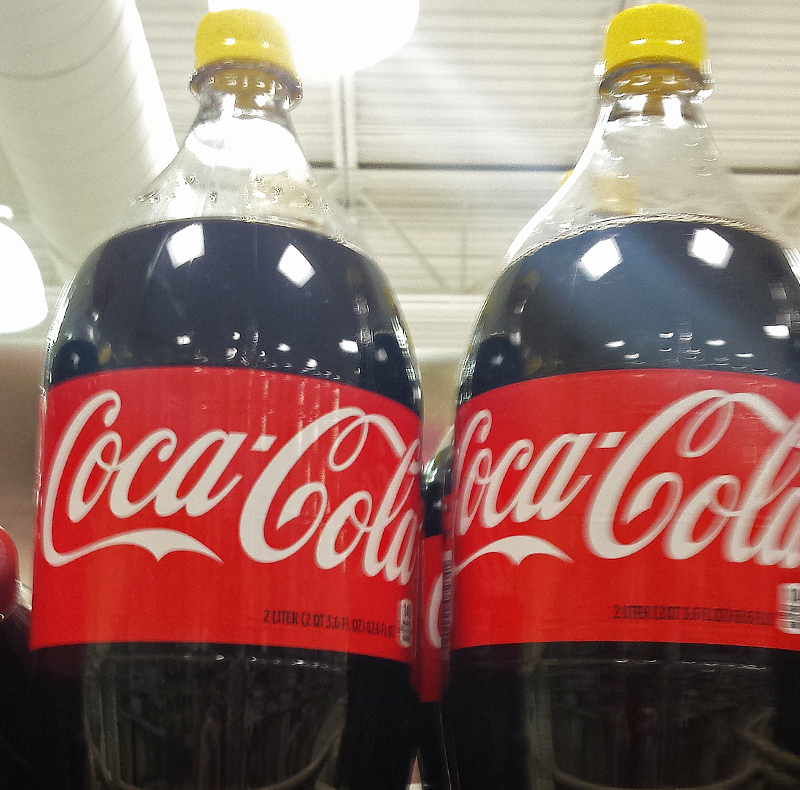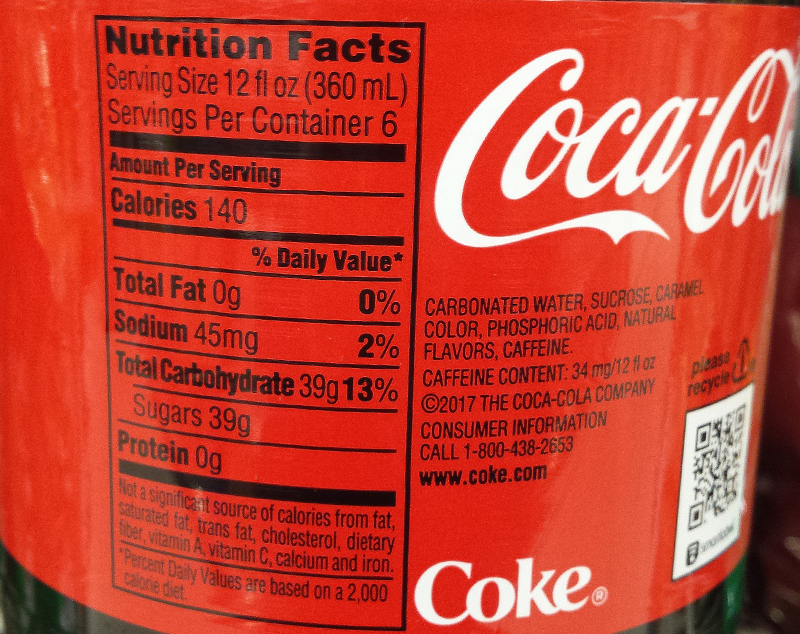If they're producing more than "x" amount of bottles, yeah, they're definitely blow-molding their own bottles on-site. Just think, empty plastic bottles take up a decent amount of space and weigh next to nothing so shipping them is very inefficient. I'd guess a typical bottling facility would go through multiple semi-trailer loads on a daily basis.I'm pretty sure some bottling companies blow mold their own bottles. A local water bottling plant gets huge deliveries of resin pellets.
You are using an out of date browser. It may not display this or other websites correctly.
You should upgrade or use an alternative browser.
You should upgrade or use an alternative browser.
Can someone explain ownerships when it comes to soft drinks?
- Thread starter Vern_in_IL
- Start date
There are longstanding contracts that don't expire simply because the company is bought or merges. In my region, the regional Pepsi bottler distributes packaged Dr. Pepper and it's specifically included in most store sales of other Pepsi products. Some regional Coke bottlers also distribute Dr. Pepper.
Fountain sales are often different. You'll find Dr. Pepper distributed along with Coke produces in their Freestyle machines and in other locations. They're also seen in where Pepsi is the main fountain drink, like at most Taco Bell and KFC locations.
Here's a KFC:

Or a McDonald's.

Internationally it gets even weirder.
Fountain sales are often different. You'll find Dr. Pepper distributed along with Coke produces in their Freestyle machines and in other locations. They're also seen in where Pepsi is the main fountain drink, like at most Taco Bell and KFC locations.
Here's a KFC:

Or a McDonald's.

Internationally it gets even weirder.
Vern_in_IL
Thread starter
Cool, I remember the 12oz can machines that had a HUGE CocaCola button and all the other "associated" flavors were smaller buttons.


Coke owns a bunch of brands-Fresca, Tab, Fanta, Barq's (technically independent, but made and sold by CCE), Mr. Pibb, Sprite, Surge, Minute Maid, Mello Yello, and others. Pepsi owns Mountain Dew, Mug root beer, Slice, Sierra Mist, and I recall AMP energy drinks. Also, CCE owns Powerade, and while they do not own it, Pepsi bottles and distributes Gatorade.
Interestingly, Schweppes and Canada Dry are owned by the same company. (Dr. Pepper-along with Crush, A&W, Hires, Stewart's, Nehi, and RC.
Interestingly, Schweppes and Canada Dry are owned by the same company. (Dr. Pepper-along with Crush, A&W, Hires, Stewart's, Nehi, and RC.
I recall one of the forklift guys telling me that one plant can fill eight 53' trailers of empty cans in a shift. And I have seen the trailers...they are STUFFED in, wall to wall, floor to roof, maybe 6" from the back doors on custom pallets.If they're producing more than "x" amount of bottles, yeah, they're definitely blow-molding their own bottles on-site. Just think, empty plastic bottles take up a decent amount of space and weigh next to nothing so shipping them is very inefficient. I'd guess a typical bottling facility would go through multiple semi-trailer loads on a daily basis.
AutoMechanic
Site Donor 2024
I don’t know much about how the ownership works but I do know I could own some of these soda companies as much as I drink them and buy them 
 .
.
in my part of Ohio, Dr. Pepper is Produced by Pepsi. the Bottles still say they are produced under license from the Dr.Pepper/7up Company, Plano TX.*
this is all related to the Original License from Dr.Pepper for this territory, back when it was an independent brand. That original Licensee was swallowed up by Pepsico at some point.
The Local 7up Distributor has tried for YEARS now to buy the license back from Pepsi... Pepsi isn't interested.
Problems come from some of the Grocery Chains, whose home office is/are out of state, where Dr.Pepper REALLY IS a 7up product, can't seem to figure out that that's not the case here, and regularly don't include it in Pepsi Sales, until someone from the local store calls them up and reminds them... Oh Yeah!
I know our Pepsi plastic bottles are made about 45 Min south of here by PlastiPak, same plant also makes all the Plastic Jugs for P&G Liquid Laundry products, as the Primary N.American Bottling plant for those is here in Lima. If you buy Tide, Gain, Downy, etc Liquid in the lower 48, the odds are >95% that it was Bottled In Lima, OH.
* until a couple years ago known as the Dr.Pepper/Schwepps, or some combo of Schwepps/Dr.Pepper/7Up...they seemed Fluid with the Marquee names...
now if you go past their facilities, it's Keurig/Dr.Pepper, as they merged a few years back.
omg, I totally Forgot about the "Dr.Pepper/Snapple group phase...
it's a great big ball of wibbly wobbly- mergers/acquisitions....
oi...
 en.wikipedia.org
en.wikipedia.org
this is all related to the Original License from Dr.Pepper for this territory, back when it was an independent brand. That original Licensee was swallowed up by Pepsico at some point.
The Local 7up Distributor has tried for YEARS now to buy the license back from Pepsi... Pepsi isn't interested.
Problems come from some of the Grocery Chains, whose home office is/are out of state, where Dr.Pepper REALLY IS a 7up product, can't seem to figure out that that's not the case here, and regularly don't include it in Pepsi Sales, until someone from the local store calls them up and reminds them... Oh Yeah!
I know our Pepsi plastic bottles are made about 45 Min south of here by PlastiPak, same plant also makes all the Plastic Jugs for P&G Liquid Laundry products, as the Primary N.American Bottling plant for those is here in Lima. If you buy Tide, Gain, Downy, etc Liquid in the lower 48, the odds are >95% that it was Bottled In Lima, OH.
* until a couple years ago known as the Dr.Pepper/Schwepps, or some combo of Schwepps/Dr.Pepper/7Up...they seemed Fluid with the Marquee names...
now if you go past their facilities, it's Keurig/Dr.Pepper, as they merged a few years back.
omg, I totally Forgot about the "Dr.Pepper/Snapple group phase...
it's a great big ball of wibbly wobbly- mergers/acquisitions....
oi...
Dr Pepper Snapple Group - Wikipedia
Last edited:
Lets Not Forget the reason KFC/TacoBell/Pizza Hut/etc have pepsi as their primary... while their owner is Currently known as YUM! Brands, YUM! only came into existence in 1997 (as Tricon Global Restaurants) when Pepsico spun them off as a "separate" company.There are longstanding contracts that don't expire simply because the company is bought or merges. In my region, the regional Pepsi bottler distributes packaged Dr. Pepper and it's specifically included in most store sales of other Pepsi products. Some regional Coke bottlers also distribute Dr. Pepper.
Fountain sales are often different. You'll find Dr. Pepper distributed along with Coke produces in their Freestyle machines and in other locations. They're also seen in where Pepsi is the main fountain drink, like at most Taco Bell and KFC locations.
Here's a KFC:

Prior to 2011, A&W Restaurants in the US were part of YUM! (pepsico), even though A&W RootBeer is a Dr.Pepper/7up Product...
isn't it all great and confusing as heck!?!
Lets Not Forget the reason KFC/TacoBell/Pizza Hut/etc have pepsi as their primary... while their owner is Currently known as YUM! Brands, YUM! only came into existence in 1997 (as Tricon Global Restaurants) when Pepsico spun them off as a "separate" company.
Prior to 2011, A&W Restaurants in the US were part of YUM! (pepsico), even though A&W RootBeer is a Dr.Pepper/7up Product...
isn't it all great and confusing as heck!?!
I still see quite a few combined A&W/KFC locations. That's got to be an interesting licensing situation with the brand name and logo shared between different products by different companies in different countries.
The really odd thing about Dr Pepper fountain sales is that different distributors cover the same areas. Somehow they manage to get themselves at every major fast food chain in the US whether or not they have contracts with Pepsi or Coke.
The only thing I can remember from visiting the World of Coke is the tasting room, where they have all their various sodas from around the world on tap.
I've had Coke from around the world, but the irony is that the product sold in the home market isn't as good as it elsewhere, where it is sweetened with sugar instead of HFCS.
And you also get a sense of the gluttonous junk food diets we have, based on the smaller container sizes that are the norm.
I've had Coke from around the world, but the irony is that the product sold in the home market isn't as good as it elsewhere, where it is sweetened with sugar instead of HFCS.
And you also get a sense of the gluttonous junk food diets we have, based on the smaller container sizes that are the norm.
I checked some things and saw where one pallet (not sure of the height) can hold about 3500 16oz bottles. You can only fit around 26 pallets in a 53' semi-trailer or 91,000 bottles. That's not a lot for a production facility.I recall one of the forklift guys telling me that one plant can fill eight 53' trailers of empty cans in a shift. And I have seen the trailers...they are STUFFED in, wall to wall, floor to roof, maybe 6" from the back doors on custom pallets.
You are right about the trailers - they know how tall they are and how much weight they can stack on a pallet so they'll fill it to the top if they can.
- Joined
- Sep 21, 2020
- Messages
- 452
What I wonder if why Coca Cola in the USA is so opposed to using sugar in their product. The HFCS stuff is noticeable and tastes too sweet, and
has a slimy mouth feel. Most other markets use cane sugar, or glucose (basically liquid sugar)....
It's the ONE reason why I refuse to buy Coca Cola.
Even Pepsi has offered their real sugar product in the USA for the USA since 2012 or so.
has a slimy mouth feel. Most other markets use cane sugar, or glucose (basically liquid sugar)....
It's the ONE reason why I refuse to buy Coca Cola.
Even Pepsi has offered their real sugar product in the USA for the USA since 2012 or so.
What I wonder if why Coca Cola in the USA is so opposed to using sugar in their product. The HFCS stuff is noticeable and tastes too sweet, and
has a slimy mouth feel. Most other markets use cane sugar, or glucose (basically liquid sugar)....
It's the ONE reason why I refuse to buy Coca Cola.
Even Pepsi has offered their real sugar product in the USA for the USA since 2012 or so.
Various markets have switched to the corn syrup recipe instead of sugar. It’s not just a US thing.
What I wonder if why Coca Cola in the USA is so opposed to using sugar in their product. The HFCS stuff is noticeable and tastes too sweet, and
has a slimy mouth feel. Most other markets use cane sugar, or glucose (basically liquid sugar)....
It's the ONE reason why I refuse to buy Coca Cola.
Even Pepsi has offered their real sugar product in the USA for the USA since 2012 or so.
HFCS is just a combination of glucose and fructose.
The sugar is in the syrup. We can get glass bottled Coke using cane sugar that was shipped from Mexico with the authorization of the Coca-Cola Company. I believe the syrup is always shipped from their Atlanta plant with the sweetener.
Around Passover, they sell Coke made with sucrose, although I'm not sure if it's cane sugar or beet sugar. It's in 2 liter bottles with a yellow cap. Some call it "Kosher Coke" even Coke with HFCS carries the Orthodox Union symbol. But for Passover, apparently corn is forbidden in some Jewish sects.

Coca-Cola Bottles With a Yellow Cap Return in 2020 — But Only For a Limited Time...
Coca-Cola bottles with a yellow cap return in 2020 to stores in select areas through the United States — but only for a limited time, because..

Various markets have switched to the corn syrup recipe instead of sugar. It’s not just a US thing.
Even with "Mexican Coke" is just a weird thing with the glass bottles being shipped to the US. Most Coke sold in Mexico is sweetened with HFCS. However, they've figured that some Americans will pay a premium for the cane sugar sweetened Coke.
Even with "Mexican Coke" is just a weird thing with the glass bottles being shipped to the US. Most Coke sold in Mexico is sweetened with HFCS. However, they've figured that some Americans will pay a premium for the cane sugar sweetened Coke.
I was in the Philippines for a number of years and their Coke was also sugar sweetened which made sense because they have a large sugar cane industry. But around five years ago they started to switch to HFCS.
I was in the Philippines for a number of years and their Coke was also sugar sweetened which made sense because they have a large sugar cane industry. But around five years ago they started to switch to HFCS.
Not sure that really matters. I was under the impression that the sugar or HFCS was already added to the syrup at their syrup plant in Atlanta before being shipped around the world. Apparently they can change the amount or type of sugar depending on specific requirements. Some countries like it less sweet.
Similar threads
- Replies
- 22
- Views
- 7K
- Locked
- Replies
- 34
- Views
- 2K
- Locked
- Replies
- 96
- Views
- 31K
